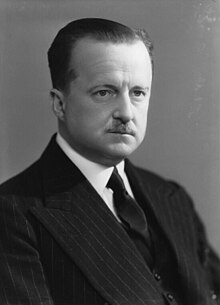The Viscount Norwich | |
|---|---|
 | |
| Secretary of State for War | |
| In office 22 November 1935 – 28 May 1937 | |
| Monarchs | George V Edward VIII George VI |
| Prime Minister | Stanley Baldwin |
| Preceded by | The Viscount Halifax |
| Succeeded by | Leslie Hore-Belisha |
| First Lord of the Admiralty | |
| In office 28 October 1937 – 3 October 1938 | |
| Monarch | George VI |
| Prime Minister | Neville Chamberlain |
| Preceded by | Sir Samuel Hoare |
| Succeeded by | The Earl Stanhope |
| Chancellor of the Duchy of Lancaster | |
| In office 20 July 1941 – 11 November 1943 | |
| Prime Minister | Winston Churchill |
| Preceded by | The Lord Hankey |
| Succeeded by | Ernest Brown |
| British Ambassador to France | |
| In office 1944–1948 | |
| Monarch | George VI |
| Preceded by | Vacant due to German occupation |
| Succeeded by | Oliver Harvey |
| Personal details | |
| Born | Alfred Duff Cooper 22 February 1890 London, England |
| Died | 1 January 1954 (aged 63) at sea, North Atlantic |
| Political party | Conservative |
| Spouse | |
| Children | John Julius |
| Parent(s) | Sir Alfred Cooper Lady Agnes Duff |
| Alma mater | New College, Oxford |
| Military service | |
| Branch/service | British Army |
| Rank | Lieutenant |
| Unit | Grenadier Guards |
| Battles/wars | First World War |
| Awards | Distinguished Service Order Mentioned in Despatches |
Alfred Duff Cooper, 1st Viscount Norwich, GCMG, DSO, PC (22 February 1890 – 1 January 1954), known as Duff Cooper, was a British Conservative Party politician and diplomat who was also a military and political historian.
First elected to Parliament in 1924, he lost his seat in 1929 but returned to Parliament in the 1931 Westminster St George's by-election, which was seen as a referendum on Stanley Baldwin's leadership of the Conservative Party. He later served in the Cabinet as Secretary of State for War and First Lord of the Admiralty. He resigned from the cabinet over the Munich agreement of 1938.
When Winston Churchill became prime minister in May 1940, he named Cooper as Minister of Information. In 1941, as a member of the Cabinet, he served as British Minister in Singapore before its fall to the Japanese. He later served an important role as representative to Charles de Gaulle's Free France (1943–44) and ambassador to France from 1944 to 1948.